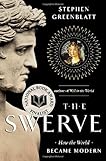 The Swerve: How the World Became Modern by Stephen Greenblatt
The Swerve: How the World Became Modern by Stephen GreenblattMy rating: 4 of 5 stars
If you are the kind of person who thinks finding a crumbling old manuscript in a dank monastery that turns out to be a fascinating glimpse into a nearly-vanished pagan philosophy on living written in verse would be cool...then you and I have a lot in common, and we both like this book already. We are also both nerds, and that's okay. We should probably travel together in order to avoid irritating our companions.
Greenblatt is clearly a scholar of considerable erudition on the Renaissance and European art and thought. While very engagingly written, I do sense that Swerve was written for the general reader rather than a more specialized audience. Perhaps because I have studied and written on similar subjects in the past, I yearned for more overtly scholarly writing (which does NOT have to be boring--The Age of Wonder and its endlessly-entrancing digressions comes to mind). I would have been happy to read several hundred more pages, especially about the ripple effect in Renaissance art that Greenblatt cunningly traces back to the discovery of Lucretius' poem. More than anything, I realized that going to the primary text--"On the Nature of Things" itself--will be the key to serious explorations of this subject.
So, on the hunt I go, but with some delightful background knowledge to buoy me.
View all my reviews




No comments:
Post a Comment